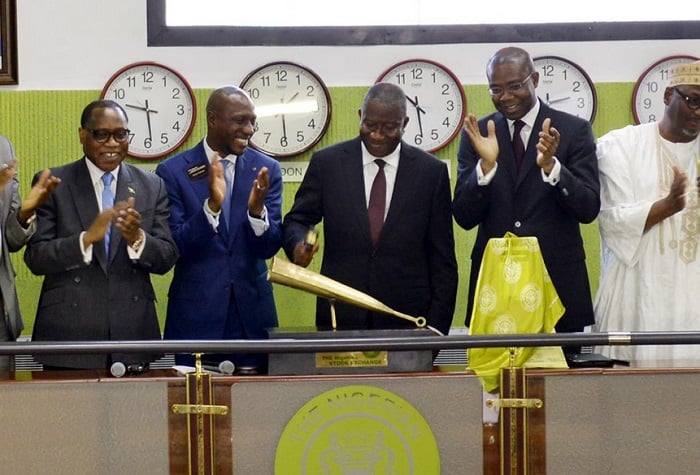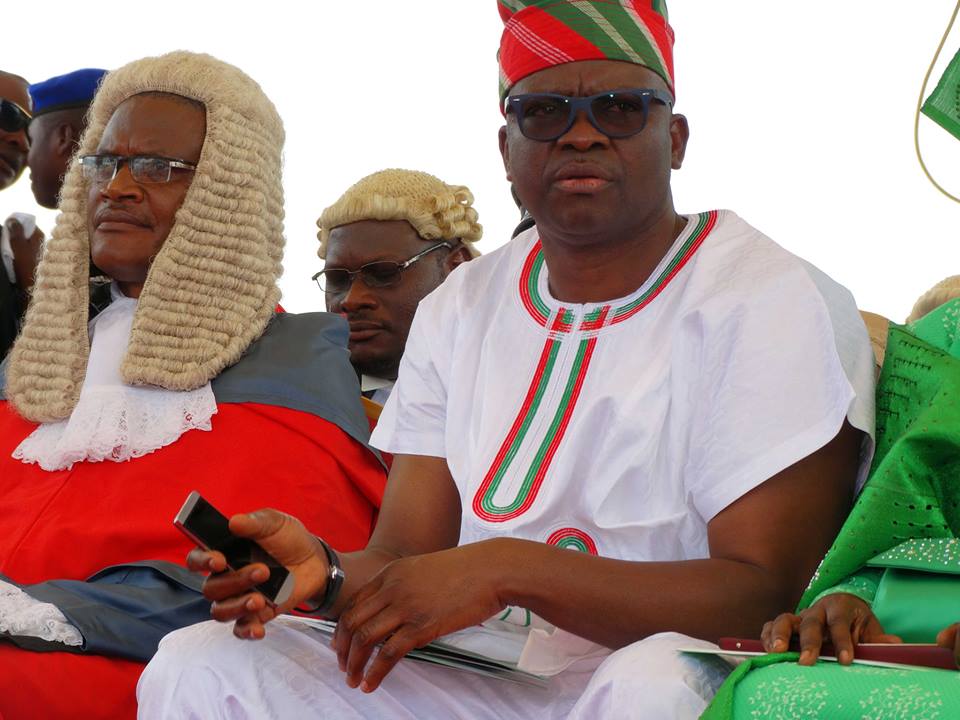President Jonathan sounding the closing gong at the Nigerian Stock Exchange in Lagos, March 12
Equities investors and traders rushed out of their hiding last week on President Goodluck Jonathan’s surprise move to concede defeat in a much feared presidential election. The stock market had lost trillions of naira in market capitalization due to flight capital seeking safety from the Nigerian economy expected to plunge into turmoil through an unprecedented electoral violence.
The President’s unexpected move has proved wrong all doomsday predictions for Nigeria, which have taken a heavy toll on the economy and financial markets. Within the two days of trading after the President congratulated his opponent on Monday, market capitalization jumped by nearly two trillion to close at about N12.14 trillion last Thursday. More than 78% of the total volume of deals and over 81% of the value of transactions during the week happened in the last two trading days.
The all-share index of the Nigerian Stock Exchange moved a clear 5,165 points or 16.9% up on the week’s opening to close at 35,728.12 last week. For the first time in several weeks, the market index and capitalization closed above their January opening levels last week. Almost all the sectoral indexes closed on the positive territory for the week with banking, oil/gas and consumer goods indexes leading the gains. The value the market gained in just two days of last week is nearly one-half of the federal government’s 2015 aggregate budget spending.
Economic activities suffered greatly over the last twelve 15 months, as the nation’s general election drew near. Many operators scaled down operations while others virtually shut down apparently to watch from the sideline the unfolding predictions of bloodshed and eventual break-up of the country. The upsurge witnessed in the stock market last week captures precisely the general bullish u-turn of the entire economy in the post presidential poll.
Advertisement
Inability to grow earnings by companies in 2014 reflects weak aggregate spending in the economy, which constrained revenues and created cash flow problems for both producers and consumers alike. The rebuilding of confidence in the nation and its economy in the current year is therefore likely to impact positively on corporate earnings as from the second quarter.
Loss of confidence, more than poor corporate earnings accounted for the rundown of share prices. The rebuilding of investor confidence is also expected to be the main factor in share price recovery.
Some of the latest corporate earnings reports released last week include MRS Oil, which showed a 5.2% increase in turnover to N92.32 billion and a 17.7% growth in after tax profit to N746 million. It is paying a dividend of 88 kobo per share. Diamond Bank grew gross earnings by 12.6% to N161.13 billion in 2014 but after tax profit declined by 10.7% to N25.48 billion. The bank has proposed a cash dividend of 10 kobo per share.
Advertisement
Chemical & Allied Products recorded an improvement of 12.8% in sales revenue to N6.99 billion last year and after tax profit went up by 17.3% to N1.66 billion during the year. It is offering shareholders a dividend of 85 kobo per share. Revenue growth was flat for CCNN at N15.12 billion in 2014 but the company raised after tax profit by 23% to N1.92 billion. It has proposed a cash dividend of 35 kobo per share.
Ashakacem suffered a moderate decline in turnover at N21.13 billion in 2014 but lifted after tax profit by 61.7% to N4.57 billion. It is paying a dividend of 45 kobo per share to shareholders. GlaxoSmithKline Consumer saw a marginal improvement in sales revenue to N30.52 billion while after tax profit dropped by 37.6% to N1.85 billion. It has proposed a cash dividend of 75 kobo per share and a bonus of 1 for 4.
Add a comment







